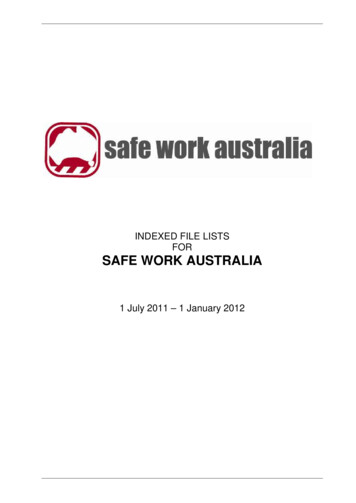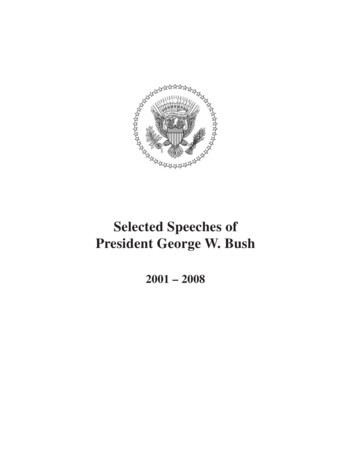
Transcription
Selected Speeches ofPresident George W. Bush2001 – 2008
SELECTED SPEECHES OF PRESIDENT GEORGE W. BUSH2001 – 2008TABLE OF CONTENTS2001The First Inaugural AddressJanuary 20, 2001 . 1Remarks to New White House StaffJanuary 22, 2001 . 7Remarks on the Education Plan Submitted to CongressJanuary 23, 2001 . 9Faith-Based and Community Initiatives AnnouncementJanuary 29, 2001 . 15Remarks at the National Prayer BreakfastFebruary 1, 2001 . 19Address to the Joint Session of the 107th CongressFebruary 27, 2001 . 23Dedication of the Pope John Paul II Cultural CenterMarch 22, 2001 . 37Tax Relief Address to the United States Chamber of CommerceApril 16, 2001 . 41Days of Remembrance ObservanceApril 19, 2001 . 47Stem Cell Address to the NationAugust 9, 2001 . 51Address to the Nation on the September 11 AttacksSeptember 11, 2001 . 57National Day of Prayer and Remembrance ServiceSeptember 14, 2001. 59Remarks to New York Rescue WorkersSeptember 14, 2001. 63Address to the Joint Session of the 107th CongressSeptember 20, 2001. 65Address to the Nation on Operations in AfghanistanOctober 7, 2001 . 75Department of Defense Service of Remembrance at the PentagonOctober 11, 2001 . 79
Address to the United Nations General AssemblyNovember 10, 2001 . 83Address at the CitadelDecember 11, 2001 . 91The World Will Always Remember September 11December 11, 2001 . 1012002State of the Union Address to the 107th CongressJanuary 29, 2002 . 103Promoting Compassionate ConservatismApril 30, 2002 . 115West Point CommencementJune 1, 2002 . 125Middle East Peace ProcessJune 24, 2002 . 133Address to the United Nations General AssemblySeptember 12, 2002. 1392003State of the Union Address to the 108th CongressJanuary 28, 2003 . 149Remarks on the Loss of the Space Shuttle ColumbiaFebruary 1, 2003 . 165Remarks on the Future of IraqFebruary 26, 2003 . 167Address to the Nation on Military Operations in IraqMarch 19, 2003 . 175Remarks on the Freedom AgendaNovember 6, 2003 . 177Remarks at Signing of Medicare Reform LegislationDecember 8, 2003 . 1892004State of the Union Address to the 108th Congress, Second SessionJanuary 20, 2004 . 197Remarks on Opening New Markets for America’s WorkersMarch 10, 2004 .213
Remarks on EducationMay 11, 2004 . 229Commemorating Ronald Wilson Reagan, Fortieth President of theUnited StatesJune 11, 2004 . 247Unveiling of President Clinton and Senator Clinton’s PortraitsJune 14, 2004 . 253Address to the Republican National ConventionSeptember 2, 2004. 2572005The Second Inaugural AddressJanuary 20, 2005 . 273State of the Union Address to the 109th CongressFebruary 2, 2005 . 279Remarks on Strengthening Social SecurityApril 18, 2005 . 295Nomination of John Roberts to the Supreme Court of the United StatesJuly 19, 2005 . 309Promoting the Central American Free Trade AgreementJuly 21, 2005 . 313Address to the Nation on Hurricane KatrinaSeptember 15, 2005. 3252006State of the Union Address to the 109th Congress, Second SessionJanuary 31, 2006 . 335Remarks on the Advanced Energy InitiativeFebruary 20, 2006 . 351Address to the Nation on ImmigrationMay 15, 2006 . 369Address to the American Legion National Convention: The IdeologicalStruggle of the 21st CenturyAugust 31, 2006 . 377Remarks on the Global War on Terror: The Enemy in Their Own WordsSeptember 5, 2006. 393Address on the Creation of Military Commissions to Try SuspectedTerroristsSeptember 6, 2006. 409
Address to the Nation on the Fifth Anniversary of 9/11September 11, 2006 . 423Address to the United Nations General Assembly: A World BeyondTerrorSeptember 19, 2006. 431Christening Ceremony of the George H. W. BushOctober 7, 2006 . 4392007Commemorating Gerald R. Ford, Thirty-Eighth President of the UnitedStatesJanuary 2, 2007 . 443Address to the Nation on IraqJanuary 10, 2007 . 447Medal of Honor Ceremony for Jason DunhamJanuary 11, 2007 . 457State of the Union Address to the 110th CongressJanuary 23, 2007 . 461Address to an International Conference on Democracy and Security inPragueJune 5, 2007 . 477Address to the Nation on the Way Forward in IraqSeptember 13, 2007. 487Remarks on Energy Security and Climate ChangeSeptember 28, 2007. 495Remarks on CubaOctober 24, 2007 . 505Address to the Annapolis ConferenceNovember 27, 2007 . 515Remarks at a Reception in Celebration of HanukkahDecember 10, 2007 . 5232008State of the Union Address to the 110th Congress, Second SessionJanuary 28, 2008 . 525Remarks on AfricaFebruary 14, 2008 . 541Remarks on the Visit of His Holiness Pope Benedict XVIApril 16, 2008 . 555
Address to the Members of the KnessetMay 15, 2008 . 557Remarks on VolunteerismSeptember 8, 2008. 565Address to the Nation on the Financial CrisisSeptember 24, 2008. 575Remarks on the United States Ocean Action PlanSeptember 26, 2008. 581Address to the White House Summit on International DevelopmentOctober 21, 2008 . 589Remarks at the Graduation Ceremony for Federal Bureau ofInvestigation Special AgentsOctober 30, 2008 . 603Remarks on the Presidential ElectionNovember 5, 2008 . 609
————1
THE FIRST INAUGURAL ADDRESSFROM WEST FRONT, U.S. CAPITOLWASHINGTON, D.C.JANUARY 20, 2001Chief Justice Rehnquist, President Carter, President Bush,President Clinton, distinguished guests and my fellow citizens:The peaceful transfer of authority is rare in history, yetcommon in our country. With a simple oath, we affirm old traditionsand make new beginnings.As I begin, I thank President Clinton for his service to ournation.And I thank Vice President Gore for a contest conducted withspirit and ended with grace.I am honored and humbled to stand here, where so many ofAmerica’s leaders have come before me, and so many will follow.We have a place, all of us, in a long story—a story wecontinue, but whose end we will not see. It is the story of a newworld that became a friend and liberator of the old, a story of aslave-holding society that became a servant of freedom, the storyof a power that went into the world to protect but not possess, todefend but not to conquer.It is the American story—a story of flawed and fallible people,united across the generations by grand and enduring ideals.The grandest of these ideals is an unfolding American promisethat everyone belongs, that everyone deserves a chance, that noinsignificant person was ever born.Americans are called to enact this promise in our lives andin our laws. And though our nation has sometimes halted, andsometimes delayed, we must follow no other course.Through much of the last century, America’s faith in freedomand democracy was a rock in a raging sea. Now it is a seed upon thewind, taking root in many nations.Our democratic faith is more than the creed of our country, it is————1
the inborn hope of our humanity, an ideal we carry but do not own,a trust we bear and pass along. And even after nearly 225 years, wehave a long way yet to travel.While many of our citizens prosper, others doubt the promise,even the justice, of our own country. The ambitions of someAmericans are limited by failing schools and hidden prejudice andthe circumstances of their birth. And sometimes our differences runso deep, it seems we share a continent, but not a country.We do not accept this, and we will not allow it. Our unity,our union, is the serious work of leaders and citizens in everygeneration. And this is my solemn pledge: I will work to build asingle nation of justice and opportunity.I know this is in our reach because we are guided by a powerlarger than ourselves who creates us equal in His image.And we are confident in principles that unite and lead us onward.America has never been united by blood or birth or soil. We arebound by ideals that move us beyond our backgrounds, lift us aboveour interests and teach us what it means to be citizens. Every childmust be taught these principles. Every citizen must uphold them.And every immigrant, by embracing these ideals, makes our countrymore, not less, American.Today, we affirm a new commitment to live out our nation’spromise through civility, courage, compassion and character.America, at its best, matches a commitment to principle with aconcern for civility. A civil society demands from each of us goodwill and respect, fair dealing and forgiveness.Some seem to believe that our politics can afford to be pettybecause, in a time of peace, the stakes of our debates appear small.But the stakes for America are never small. If our country doesnot lead the cause of freedom, it will not be led. If we do not turnthe hearts of children toward knowledge and character, we will losetheir gifts and undermine their idealism. If we permit our economyto drift and decline, the vulnerable will suffer most.We must live up to the calling we share. Civility is not a tacticor a sentiment. It is the determined choice of trust over cynicism,————2
of community over chaos. And this commitment, if we keep it, is away to shared accomplishment.America, at its best, is also courageous.Our national courage has been clear in times of depression andwar, when defending common dangers defined our common good.Now we must choose if the example of our fathers and motherswill inspire us or condemn us. We must show courage in a time ofblessing by confronting problems instead of passing them on tofuture generations.Together, we will reclaim America’s schools, before ignoranceand apathy claim more young lives.We will reform Social Security and Medicare, sparing ourchildren from struggles we have the power to prevent. And we willreduce taxes, to recover the momentum of our economy and rewardthe effort and enterprise of working Americans.We will build our defenses beyond challenge, lest weaknessinvite challenge.We will confront weapons of mass destruction, so that a newcentury is spared new horrors.The enemies of liberty and our country should make no mistake:America remains engaged in the world by history and by choice,shaping a balance of power that favors freedom. We will defend ourallies and our interests. We will show purpose without arrogance.We will meet aggression and bad faith with resolve and strength.And to all nations, we will speak for the values that gave our nationbirth.America, at its best, is compassionate. In the quiet of Americanconscience, we know that deep, persistent poverty is unworthy ofour nation’s promise.And whatever our views of its cause, we can agree that childrenat risk are not at fault. Abandonment and abuse are not acts of God,they are failures of love.And the proliferation of prisons, however necessary, is nosubstitute for hope and order in our souls.Where there is suffering, there is duty. Americans in need are————3
not strangers, they are citizens, not problems, but priorities. And allof us are diminished when any are hopeless.Government has great responsibilities for public safety andpublic health, for civil rights and common schools. Yet compassionis the work of a nation, not just a government.And some needs and hurts are so deep they will only respond to amentor’s touch or a pastor’s prayer. Church and charity, synagogueand mosque lend our communities their humanity, and they willhave an honored place in our plans and in our laws.Many in our country do not know the pain of poverty, but we canlisten to those who do.And I can pledge our nation to a goal: When we see thatwounded traveler on the road to Jericho, we will not pass to theother side.America, at its best, is a place where personal responsibility isvalued and expected.Encouraging responsibility is not a search for scapegoats, it isa call to conscience. And though it requires sacrifice, it brings adeeper fulfillment. We find the fullness of life not only in options,but in commitments. And we find that children and community arethe commitments that set us free.Our public interest depends on private character, on civic dutyand family bonds and basic fairness, on uncounted, unhonored actsof decency which give direction to our freedom.Sometimes in life we are called to do great things. But as a saintof our times has said, every day we are called to do small thingswith great love. The most important tasks of a democracy are doneby everyone.I will live and lead by these principles: to advance myconvictions with civility, to pursue the public interest with courage,to speak for greater justice and compassion, to call for responsibilityand try to live it as well.In all these ways, I will bring the values of our history to the careof our times.What you do is as important as anything government does. I ask————4
you to seek a common good beyond your comfort; to defend neededreforms against easy attacks; to serve your nation, beginning withyour neighbor. I ask you to be citizens: citizens, not spectators;citizens, not subjects; responsible citizens, building communities ofservice and a nation of character.Americans are generous and strong and decent, not because webelieve in ourselves, but because we hold beliefs beyond ourselves.When this spirit of citizenship is missing, no government programcan replace it. When this spirit is present, no wrong can standagainst it.After the Declaration of Independence was signed, Virginiastatesman John Page wrote to Thomas Jefferson: "We know the raceis not to the swift nor the battle to the strong. Do you not think anangel rides in the whirlwind and directs this storm?"Much time has passed since Jefferson arrived for hisinauguration. The years and changes accumulate. But the themes ofthis day he would know: our nation’s grand story of courage and itssimple dream of dignity.We are not this story’s author, who fills time and eternity withhis purpose. Yet his purpose is achieved in our duty, and our duty isfulfilled in service to one another.Never tiring, never yielding, never finishing, we renew thatpurpose today, to make our country more just and generous, toaffirm the dignity of our lives and every life.This work continues. This story goes on. And an angel still ridesin the whirlwind and directs this storm.God bless you all, and God bless America.————5
————6
REMARKS TO NEW WHITE HOUSE STAFFTHE EAST ROOM OF THE WHITE HOUSEWASHINGTON, D.C.JANUARY 22, 2001The First Lady and I are honored to be living here, and we’rehonored to be hosting this event—the first we’ve done in thisglorious room since the Inauguration.I want to thank the family members who are here. Thank youfor your sacrifice. Thank you for the long hours, for accepting thelong hours that your loved one is about to put in on behalf of theAmerican people. Some of the folks that are here have worked inpast administrations. For some of us, this is a new experience. Butfor all of us, it is an honor of a lifetime, and it is our privilege toshare this together.I am here to lead the executive branch of government. You allare here because you have my full confidence. And we are here withthe same basic purpose, to serve the American people. We have alltaken an oath, and from this moment on it is our job to honor it.Today everything is so promising and new. My hope is that theday will never come when any of us take this place for granted andthis honor for granted. As we serve, we must always rememberthree things.First, we must remember the high standards that come withhigh office. This begins with careful adherence to the rules. Iexpect every member of this administration to stay well withinthe boundaries that define legal and ethical conduct. This meansavoiding even the appearance of problems. This means checkingand, if need be, double-checking that the rules have been obeyed.This means never compromising those rules. No one in the WhiteHouse should be afraid to confront the people they work for, forethical concerns. And no one should hesitate to confront me, aswell. We’re all accountable to one another. And above all, we’reall accountable to the law and to the American people. My White————7
House Counsel, Al Gonzalez, is my point man on these issues. Ifyou have even a hint of ethical doubt, I urge you to talk to Al.Second, we must remember that high standards of conductinvolve not only obeying the law but showing civility. As we goabout our work, there is no excuse for arrogance and never a reasonfor disrespect toward others. People who work here are highlyvisible throughout the government. In many ways, in many of yourdealings, you’ll be the face and voice of the White House staff. Youwill be my representative. I expect each of you, as an official ofthis administration, to be an example of humility and decency andfairness.And finally, we must all remember that we are here for areason. You and I and the Vice President share the same goals forour country and the same commitment to achieving them. We arehere to make progress. We are not here just to mark time. Duringthe next few weeks, we’ll affirm the central policy goals of thisadministration, beginning this week with education reform.Everyone will know where we stand. Everyone will know wherewe’re headed. Every morning I want you to remember these goals.Every evening I want you to review the progress we have made.I want it said of us, at the end of our service, that promises madewere promises kept.On a mantelpiece in this great house is inscribed the prayer ofJohn Adams, that only the wise and honest may rule under thisroof. He was speaking of those who live here. But wisdom andhonesty are also required of those who work here. I know each ofyou is capable of meeting that charge. This is only our second day,but time moves fast around here. So let us begin the work we werehired to do and leave this a better place than we found it.————8
REMARKS ON THE EDUCATION PLANSUBMITTED TO CONGRESSTHE EAST ROOM OF THE WHITE HOUSEWASHINGTON, D.C.JANUARY 23, 2001Thank you, Mr. Secretary. Appreciate you being here. And it’sgood to see a former secretary of Education here. Lamar, thank youvery much for coming. Surrounded by two fine Texans, I might add.You are in good position! I was going to say a rose between twothorns - but Diane Natalisio is not a thorn, she’s a fabulous educatorin the great state of Texas. Miller, on the other hand. at any rate,I’m glad you all are here. It’s good to see so many faces of friends.Welcome you to our new temporary abode.This is an important moment for my administration because Ispent such amount of — a long amount of time campaigning oneducation reform. It’s been the hallmark of my time as governor ofTexas. My focus will be on making sure every child is educated, asthe president of the United States as well.Both parties have been talking about education reform for quitea while. It’s time to come together to get it done so that we cantruthfully say in America, “No child will be left behind — not onesingle child.”We share a moment of exceptional promise — a newadministration, a newly sworn-in Congress, and we have a chanceto think anew and act anew.All of us are impatient with the old lines of division. All of uswant a different attitude here in the nation’s capital. All in this room,as well as across the country, know things must change.We must confront the scandal of illiteracy in America, seen mostclearly in high-poverty schools, where nearly 70 percent of fourthgraders are unable to read at a basic level. We must address the lowstanding of America test scores amongst industrialized nations inmath and science, the very subjects most likely to affect our future————9
competitiveness. We must focus the spending of federal tax dollarson things that work. Too often we have spent without regard forresults, without judging success or failure from year to year.We must face up to the plague of school violence, with anaverage of 3 million crimes committed against students and teachersinside public schools every year. That’s unacceptable in our country.Change will not come by adding a few new federal programs to theold. If we work only at the edges, our influence will be confined tothe margins. We need real reform.Change will not come by disdaining or dismantling the federalrole of education. I believe strongly in local control of schools. Itrust local folks to chart the path to excellence. But educationalexcellence for all is a national issue, and at this moment is apresidential priority. I’ve seen how real education reform can lift upscores in schools and effectively change lives.And real education reform reflects four basic commitments.First, children must be tested every year in reading and math. Everysingle year. Not just in the third grade or the eighth grade, but in thethird, fourth, fifth, sixth and seventh and eighth grade. I oppose anational test, one designed here in Washington, D.C., because I nowit would undermine local control of schools and undermine statecurricula. But states should test each student each year. Withoutyearly testing, we don’t know who is falling behind and who needshelp. Without yearly testing, too often we don’t find failure until itis too late to fix.Consider what some parents face under the current system insome states. A child may pass the third grade reading test.He or she gets in the eighth grade and, lo and behold, fails theeighth grade test. And the parent says, “Who do I hold accountable?What happened? My child was successful in the third, and here heor she is in the eighth. What went wrong? How come? Where didthe system let me down?”Too much precious time has lapsed in this case for us to achievewhat we want: every child being able to learn. Testing every childevery year is the way to stop the cycle. We must care enough to————10
ask how our children are doing. We must have the data to knowhow poor and minority children are doing, to see if we’re closingthe achievement gap in America. Annual measurement is a specialconcern of mine. I understand it’s crucial — it’s a crucial part of —of a solid reform package.But the good news is, I’m not alone. Take, for example,Congressman George Miller from California. Some might think itodd that the President — a Republican President be mentioning aDemocrat member of the House. But he and I have had discussionsalready. He understands the importance of strong accountability.And we’re going to work together to make sure this is an integralpart of a reform package coming through the House and Senate.Secondly, the agents of reform must be schools and schooldistricts, not bureaucracies. Teachers and principals, local and stateleaders must have the responsibility to succeed and the flexibilityto innovate. One size does not fit all when it comes to educating thechildren in America. School districts, school officials, educationalentrepreneurs should not be hindered by excessive rules and redtape and regulation.The principle here is a basic one. If local schools do not have thefreedom to change, they cannot be held accountable for failing tochange. Authority and accountability must be aligned at the locallevel, or schools will have a convenient excuse for failure. “I wouldhave done it this way, but some central office or Washington, D.C.,caused me to do it another way.”Flexibility in education spending is a special concern ofmembers of both parties with whom I’ve discussed. Today I had agood meeting with the chairman of the Education Committee in theHouse, John Boehner. I know he shares my passion for flexibilityat the local level, as with people like Senator Judd Gregg or TimHutchinson.Third, many of our schools, particularly low-income schools,will need help in the transition to higher standards. When a statesets standards, we must help schools achieve those standards.We must measure, we must know; and if a school or school————11
district falls short, we must understand that help should be applied.Senator Jeff Bingaman of New Mexico brought this up to ourattention, about the need to make sure there is a transition periodbetween the moment — the moment of consequence and the firstindication of failure. Once failing schools are identified, we willhelp them improve. We’ll help them help themselves. Our goal is toimprove public education. We want success, and when schools arewilling to accept the reality that the accountability system points outand are willing to change, we will help them.Fourth, American children must not be left in persistentlydangerous or failing schools. When schools do not teach and willnot change, parents and students must have other meaningfuloptions. And when children or teenagers go to school afraid ofbeing threatened or attacked or worst, our society must make it clearit’s the ultimate betrayal of adult responsibility.Parents and children who have only bad options must eventuallyget good options, if we are to succeed all across the country. Thereare difference of opinions about what those options should be. Imade my opinion very clear in the course of the campaign, and willtake my opinion to the Hill and let folks debate it.Today, I was pleased to see
SELECTED SPEECHES OF PRESIDENT GEORGE W. BUSH 2001 - 2008 TABLE OF CONTENTS 2001 The First Inaugural Address January 20, 2001 .1 Remarks to New White House Staff
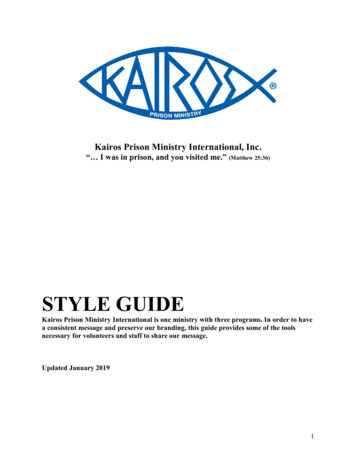
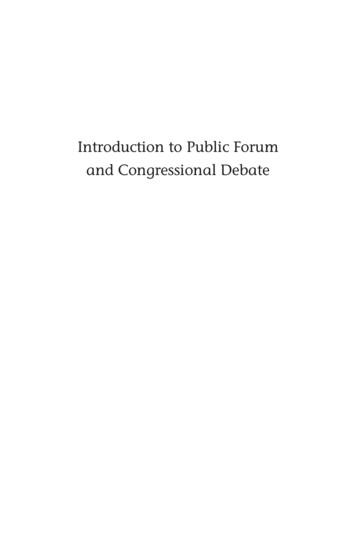
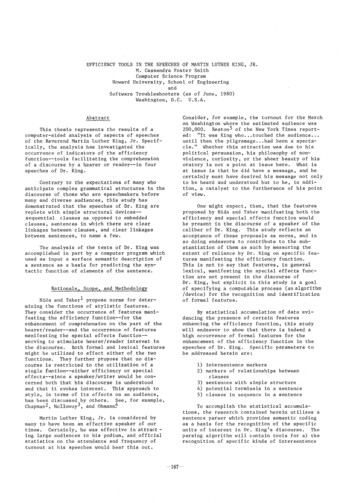
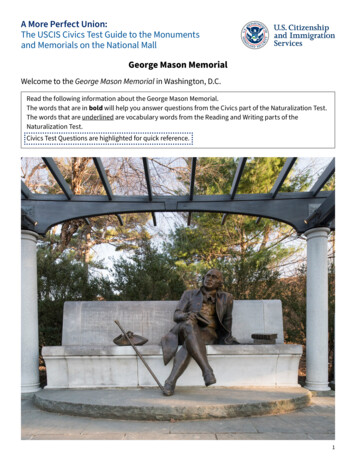

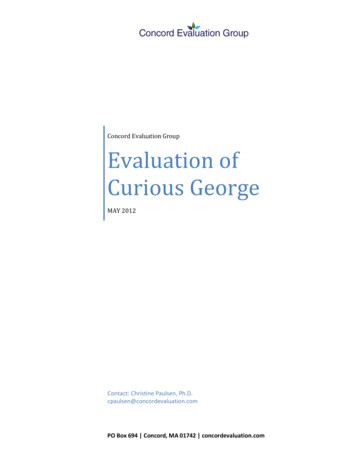
![WELCOME [ montclair.edu]](/img/31/commencement-program-2022.jpg)



